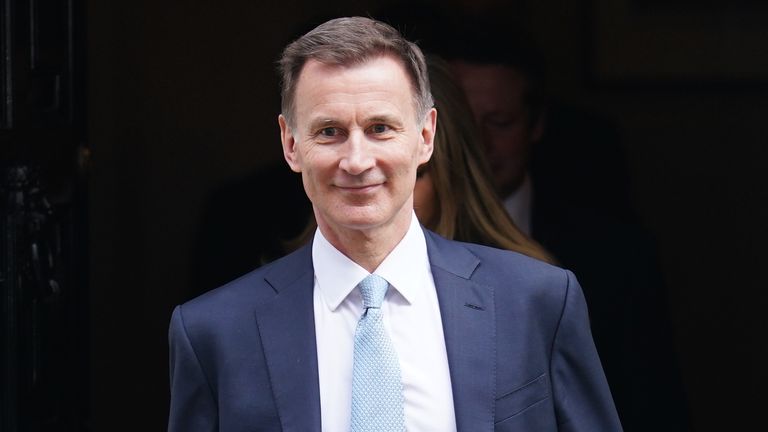Jeremy Hunt is convening a summit aimed at enticing more companies to London’s stock market amid an accelerating exodus of businesses being picked off by overseas and financial predators.
Sky News has learnt that the Treasury has invited the bosses of some of Britain’s most prominent private companies to attend a meeting next month at Dorneywood, the chancellor’s weekend country residence.
Sources said the day-long event on 16 May would target entrepreneurs behind potential flotation candidates from the fintech and biotech sectors.
Bim Afolami, the City minister, and Lord Petitgas, the prime minister’s chief business adviser, will also be present, alongside key government officials and executives from the London Stock Exchange, the sources added.
In the invitation, a copy of which has been seen by Sky News, the Treasury said attendees and the chancellor would “discuss the UK’s capital markets and how they can support innovative, high-growth companies such as yours to achieve your growth ambitions”.
“The UK’s capital markets play a key role in our economy: driving growth, creating jobs and facilitating investment.
“The government is committed to ensuring that the UK remains the best place for companies to grow, and is already taking forward an ambitious programme of reforms to improve the competitiveness of the UK.”
Dozens of companies, including the likes of digital banks Monzo and Starling Bank, are understood to have been on the invitation list.
The Dorneywood summit has been planned for several months, according to officials, who denied that it was being staged in response to a glut of companies which have announced in recent weeks that they are in receipt of takeover bids or that they would unilaterally delist from the London market.
Approaches this week for Anglo American, the £30bn mining giant, and Darktrace, the cybersecurity company, have exacerbated the impression of a growing ‘de-equitisation’ of the UK stock market.
Although neither of those deals have yet to be formally agreed, a string of others have, including International Paper’s bid for DS Smith, the FTSE-100 paper and packaging group, which was revealed by Sky News last month.
Other companies which have agreed deals with suitors include Virgin Money, which is set to be bought by Nationwide in a £3bn deal.
Yet more, such as the Royal Mail parent International Distributions Services and the music royalties company Hipgnosis Songs Fund, are in receipt of serious takeover approaches.
While frenetic periods of mergers and acquisitions are far from uncommon, bankers and investors point to a dearth of attractive new opportunities to deploy capital because the flow of initial public offerings has been so slow.
Many of the companies that London would have hoped to attract, including the private equity firm CVC Capital Partners and the chip designer ARM Holdings, opted to list in Amsterdam and New York respectively.
The perception of London’s decline is being heightened by the decisions of boards to move their existing UK listings to other international exchanges, with TUI Travel and Flutter Entertainment, the gambling group behind Paddy Power, among those to relegate their London market presence.
Bosses of companies as large as Shell, the oil behemoth, have also begun to acknowledge publicly their frustration at what they perceive to be a gulf between their intrinsic valuation and that which the public markets are attaching to them.
Earlier this month, the boss of E-Therapeutics, a fast-growing but loss-making biotech company, described the London stock market as “broken and closed” as he announced plans to delist it and pursue a New York flotation at a future date.
This weekend, one government insider said the Dorneywood meeting would be important because it would highlight to fast-growing British companies that listing overseas “is not all milk and honey”.
A number of the UK-based businesses – such as Arrival, Cazoo and Benevolent AI – which went public in Europe and the US during the now-faded boom for special purpose acquisition companies – have seen their valuations crash, with some subsequently cancelling their listings.
“We need to explain to companies why London’s capital markets are the right place for these businesses to go public,” said one government source.
A Treasury spokesperson said: “The chancellor is meeting with a number of firms to hear their reflections on UK markets and what more the government and regulators can do to support their growth.”


